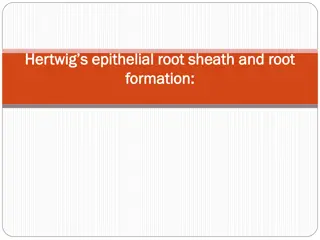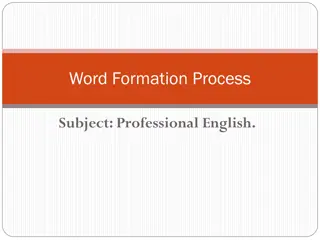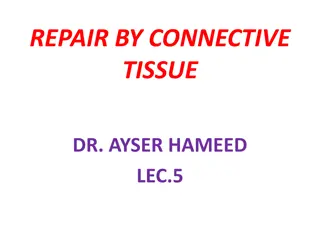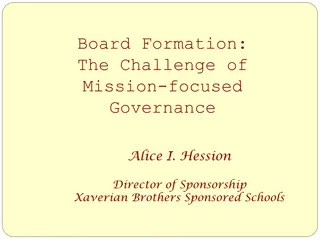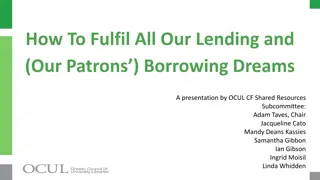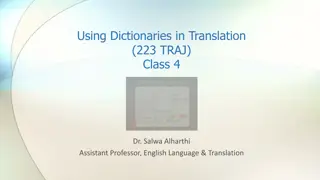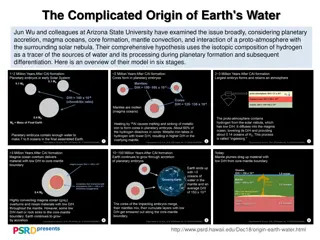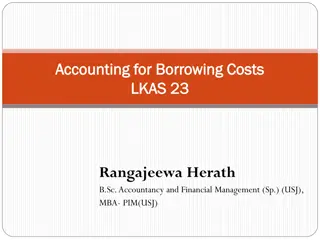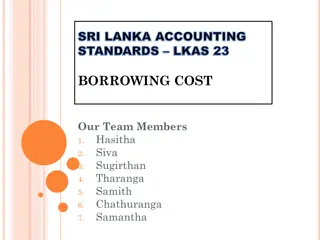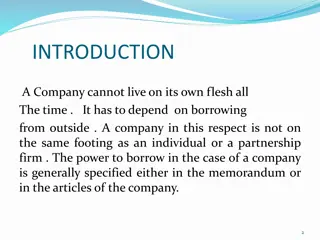Understanding Word Formation: Processes, Neologisms, and Borrowing
Delve into the fascinating world of word formation processes, from coinage and eponyms to borrowing and compounding. Explore how new words enter languages, the study of word origins (etymology), and the dynamics of creating and adopting new linguistic terms.
Download Presentation

Please find below an Image/Link to download the presentation.
The content on the website is provided AS IS for your information and personal use only. It may not be sold, licensed, or shared on other websites without obtaining consent from the author. Download presentation by click this link. If you encounter any issues during the download, it is possible that the publisher has removed the file from their server.
E N D
Presentation Transcript
Chapter Five Word Formation
Example: hoover hovering (electric suction sweeper) invented word, became familiar all over the world Could have been : spangler, - spanglering, spanglerish, spanglerism Why can we understand very quickly new words and accept the usage of different forms of that word? Because there is a lot of regularity in word formation processes in languages.
Word Formation Neologism a new word in our language and the use of different forms of that new word. Etymology the study of the origin and history of a word is known as its etymology Latin and Greek. Thee are many different ways in which new words can enter a language. Many words used today were considered once a misuse of language, e.g., handbook, aviation The constant creation of new terms and the new uses of old terms are a sign of the vitality of language (alive) which is shaped by the need of its users
Coinage The least common process of word formation Invention of totally new terms. Trade names for commercial products that become general terms or household names: kleneex, xerox, google, ebay. After their invention, they tend to become everyday words in the language.
Cont.. Eponyms new words that are based on the name of a person or a place e.g. hoover, sandwich, jeans.
Borrowing one of the most common process of word formation. English language has adopted many words from other languages such as: croissant (French), piano (Italian), sofa (Arabic). Other languages borrow words from English such as suupaamaaketto (Japanese), French saying le stress, and le weekend. Calque loan translation (a special type of borrowing): direct translation of the elements of a word into the borrowing language. French term gratte-ciel scrape-sky, Dutch wolkenkrabber cloud scratcher or German Wolkenkratzer (cloud scraper) all are calques of English skyscraper. Other examples: perros calientes (hot dogs).
Compounding Joining two separate words to form a single form. E.g. English compounds bookcase, sunburn, wallpaper. A very productive source of new terms
Blending Taking the beginning of one word and joining it to the end of the other word. E.g. gasoline + alcohol = gasohol; smoke + fog =smog breakfast + lunch = brunch Also can be used to describe the mixing of languages, e.g., Spanglish
Clipping Reduction of a word/ when a word of more than one syllable is reduced to a shorter term E.g. Fax (facsimile); ad (advertisement); fan (fanatic); flu (influenza), gym, lab, math, prof (a particular type of reduction) Australian and British English produce forms known as hypocorisms. A longer word is reduced to a single syllable then y or ie is added, e.g., movie (moving pictures) telly (television); Aussie (Australian); barbie (barbecue); hankie (handkerchief)
Backformation A special type of reduction is called backformation Typically a word of one type (usually a noun) is reduced to form a word of another type (usually a verb). E.g. the noun Televison became the verb televise; donation-donate, babysitter babysit; (nouns ending in the er sound can easily be turned to verbs) e.g., sculptor sculpt; burglars burgle, peddlers peddle;
Conversion A change in the function of a word, e.g., when a noun becomes a verb or vice versa; without any reduction. Also known as category change or functional shift. E.g. bottle, vacation, butter (nouns came to be used as verbs) We bottled the jam last night. Have you buttered the toast. They re vacationing in Florida. Or verbs can convert into noun, e.g., guess, spy, must becomes: a guest, a must , a spy or Phrasal verbs into nouns: e.g. to print out; to take over becomes: printout; takeover Verb combinations to a noun, e.g., want to be-- wannabe
Cont Verbs into adjectives: e.g. see through, stand up see-through material or a stand-up comedian. Adjectives into verbs/nouns: e.g. a dirty floor, an empty room, becomes: to dirty, to empty (verbs) Compound nouns become adjectival or verbal functions e.g. the ball park, carpool, microwave Up and down used as verbs up the price or downed a few cokes
Acronyms Formed from the initial letters of a set of other words; e.g. CD (compact disk) we pronounce each single letter, or pronounced as new single words : NATO, NASA, UNESCO, laser (light amplification by stimulated emission of radiation), ATM 9automatic teller machine), PIN (personal identification number)
Derivation the most common word formation process in the production of new English words Derivation by joining small bits of the language which do not have separate listing in the dictionaries. These small bits are called affixes. E.g. (un, mis, pre, ful, less, ish, ism, ness) in words like: Unhappy, misrepresent, prejudge, joyful, careless, boyish, terrorism, sadness Prefixes added at the beginning of the word. (un-, mis-) Suffixes at the end of the word. (-less, -ish) E.g. mislead, disrespectful, foolishness Infixes when an affix is incorporated inside a word, not normally used in English but when used indicate aggravating circumstances e.g absogoddamlutely, godtripledammit, Singabloodypore
Kamhmu A language spoken in South East Asia (Better example for infixes ) They follow a regular pattern whereby the infix rn- is added to verbs to form nouns. Verb see (to drill) toh (to chisel) hiip (to eat with a spoon) hoom (to tie) which to tie) Noun srnee (a drill) trnoh (a chisel) hrniip (a spoon) hrnoom (a thing with
Multiple processes Deli borrowing, delicatessen (German) an then clipped. Snowballed compounding (snow and ball) and then converted from noun to a verb Lase acronyms and then bacformation (laser into lase); waspish attitude, comes from WASP (white Anglo- Saxon Protestant) lost the capital letters and gained a suffix, -ish in the derivation process Yuppie young urban professional + -ie (hypocorism)





